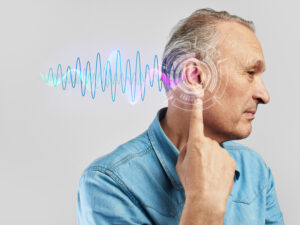 Hearing loss is one of the most common conditions affecting older adults. According to the National Institute of Health (NIH), hearing loss affects about 27% of adults ages 60–69, about 55% of those 70–79, and over 90% of adults 85 and older.
Hearing loss is one of the most common conditions affecting older adults. According to the National Institute of Health (NIH), hearing loss affects about 27% of adults ages 60–69, about 55% of those 70–79, and over 90% of adults 85 and older.
The effect of hearing loss on an older person can be devastating. Having trouble hearing can make it hard to understand and follow a doctor’s advice. Hearing doorbells and alarms becomes difficult. Having conversations becomes hard. This can be frustrating, embarrassing and at worse, dangerous.
But, these are not the only problems that can follow hearing loss.
In a study that tracked 639 adults for nearly 12 years, a Johns Hopkins research team found that mild hearing loss doubled dementia risk. Moderate loss tripled risk, and people with a severe hearing impairment were five times more likely to develop dementia.
There are options to help with hearing loss, but first you need to detect its occurrence. Here are some questions based on a tool for hearing loss. If you answer yes to three or more of these questions you could have a hearing problem and you should check with your doctor.
- Do you sometimes feel embarrassed when you meet new people because you struggle to hear?
- Do you feel frustrated when talking to members of your family because you have difficulty hearing them?
- Do you have difficulty hearing when someone speaks in a whisper?
- Do you feel restricted or limited by a hearing problem?
- Do you have difficulty hearing when visiting friends, relatives, or neighbors?
- Does a hearing problem cause you to attend religious services less often than you would like?
- Does a hearing problem cause you to argue with family members?
- Do you have trouble hearing the TV or radio at levels that are loud enough for others?
- Do you feel that any difficulty with your hearing limits your personal or social life?
- Do you have trouble hearing family or friends when you are together in a restaurant?
Hearing loss can happen for a number of different reasons. Hearing loss might be a genetic trait or may be caused by illness or injury. Another reason for hearing loss is having been exposed to extended periods of loud noise. Many construction workers, farmers, musicians, airport workers, and people in the armed forces are subject to hearing loss.
There are a number of ways to address hearing loss. You must determine what works best for you and your circumstances. Here are a few ways to counteract hearing loss:
- Hearing aids. They make sounds louder. Often things will sound different than you are used to, which can make getting use to a hearing aid difficult. You may need to try a number of hearing aids before you find the one that works for you.
- Cochlear implants. These are small electronic devices surgically implanted in the inner ear. These implants are for people whose hearing loss is severe.
- Assistive listening device. These include amplifying devices for the telephone, or cell phone. They can also be helpful in places of worship, theaters, and auditoriums.
- Lip reading. People who use this method pay close attention to others when they talk, by watching how the speaker’s mouth moves.
Hearing aids and other devices are rarely covered by insurance, and they are not inexpensive. But, the cost to the individual with hearing loss is much more in loss of quality of life.
SeniorCare keeps a list of organizations that assist with hearing aids and other hearing assistance devices. To learn more, call SeniorCare at 978-281-1750 or TTY: 978-282-1836 and ask to speak with an Information & Referral Specialist.
